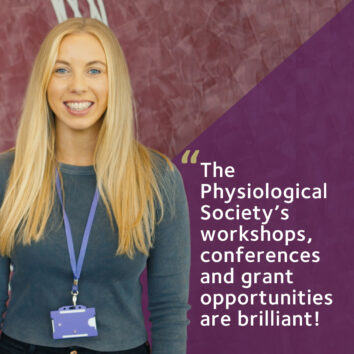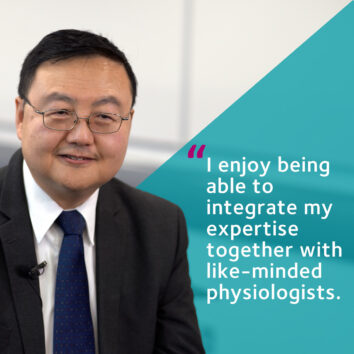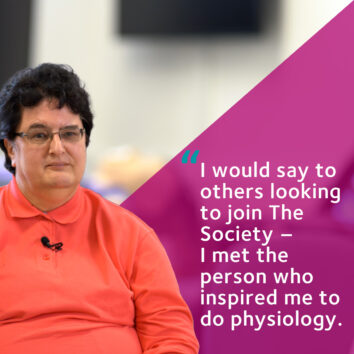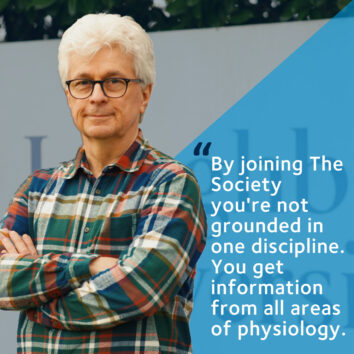

Dr Chinedu Agwu
What I enjoy the most about being part of The Physiological Society is just being part of a community. That sense of belonging where I can meet other like-minded people. We could talk about science, we could talk about our challenges, but also our victories.
Career journey
At Brunel Medical School Dr Agwu is a lecturer (education) in Biosciences and takes part in teaching physiology using a Team-Based Learning (TBL) approach as a content expert and as a TBL Facilitator. Students learn in teams and scientists alongside clinicians teach in teams, combining their diverse expertise. Dr Agwu is part of a TBL team that facilitates about 100 medical students per class. TBL is an evidence-based collaborative teaching strategy designed around “modules,” that are taught in a three-step cycle: preparation, in-class readiness assurance testing, and application-focused exercise with immediate feedback from the content expert.

Hear from Dr Chinedu Agwu
Questions and Answers
What inspired you to work and/or study cell biology?
Just interest, I studied biomedical science for my bachelor’s and cell biology; and in particular female physiology really peaked my interest.
What inspired you to join The Physiological Society?
The opportunity to network; to meet other physiologists in other fields from like cardiology to respiratory. And learn from them; exchange best practice.
What do you enjoy the most about working in physiology?
What I enjoy most is how everything is integrated from cells, molecular level to systems and to the whole body, and it just connects everything.
What’s been the most exciting part of your career?
This was my PhD project. I really enjoyed it. It was around vascular biology.
What’s been the biggest challenge of your career?
There aren’t a lot, but I guess, it’s just getting more young people excited about the physiology, making it more accessible, especially to a diverse cohort.
How has being a member of The Society benefited your career?
Educational resources, posts on Twitter and YouTube. Just getting regular updates about what other physiologists have going on.
Why do you think physiology is important as a career and in the future? How do you feel physiology or your area of research has an impact on the world?
Because it’s just life as we know it. It helps you to understand how your body works in health and in disease and how it adapts to different challenges it faces in the environment.
It’s important to teach the next generations because it just impacts so many sectors of life; education, so passing on that knowledge down. But even in government; health policies that are released.
What do you enjoy the most about being a part of The Society?
Being part of a community. That sense of belonging where I can meet other like-minded people. We could talk about science, we could talk about our challenges, but also our victories.
What would you say to others looking to join The Society?
What I would say to people looking to join is just do it. It’s definitely a worthy investment; the opportunity to do public engagement and just meet incredible people in the field. So definitely do it.
Timeline
November 2019
First full-time job as medical writer
January 2020
Passed PhD VIVA
March 2021
Secured first academic post as a teaching fellow
December 2021
Secured first full-time lectureship post
October 2022
Trained to be a TBL facilitator
December 2022
Early Career Lecturer Focus Group
Dr Chinedu Agwu
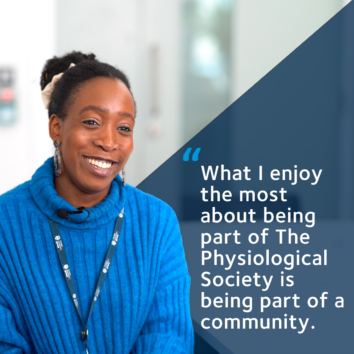
Timeline
November 2019
First full-time job as medical writer
January 2020
Passed PhD VIVA
March 2021
Secured first academic post as a teaching fellow
December 2021
Secured first full-time lectureship post
October 2022
Trained to be a TBL facilitator
December 2022
Early Career Lecturer Focus Group
